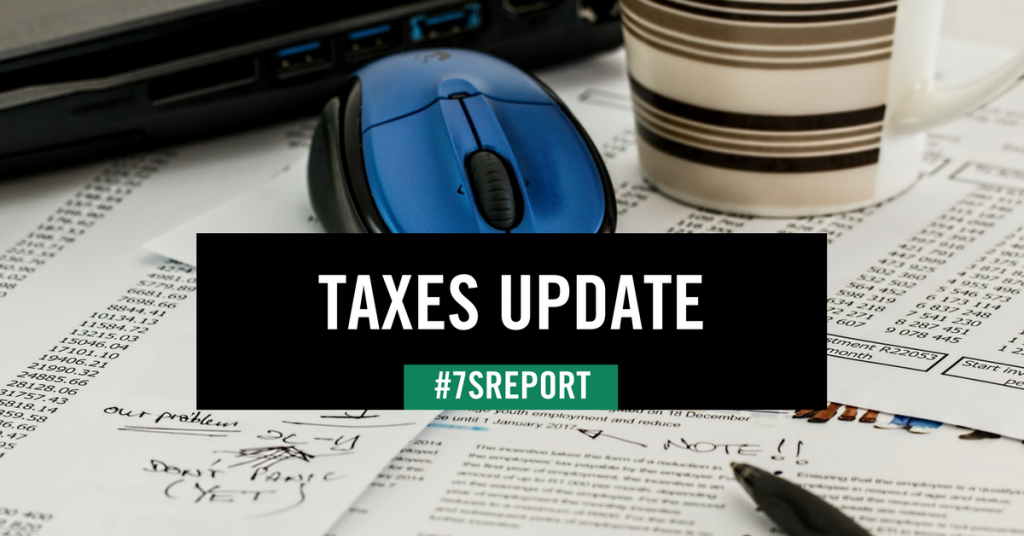Taxes Update, August 23, 2017
The Sevens Report is everything you need to know about the markets in your inbox by 7am, in 7 minutes or less. Start your free two-week trial today and see what a difference the Sevens Report can make.
What a difference a few days can make. By Thursday’s close, the S&P 500 was at a one-month low, and the prospects for any tax cuts or foreign profit repatriation tax holiday were dim.
Now, thanks to one Politico article, happy days are here again, as the S&P 500 surged on the idea that the leaders in Washington are actually making progress on tax cuts! Hopefully, you can sense my sarcasm.
The lack of liquidity and attendance in the market is making these tax-related market mood swings worse than they otherwise should be, so I wanted to step back and provide a clear, unemotional update on the tax cut situation.
Starting with Tuesday’s Politico article, there were two reasons it was positive: The “Big Six,” and 22% to 25%. Starting with the latter, you know from this Report that right now, the market is expecting a corporate tax cut in Q1 2018 down to 28%. If that happens, it likely isn’t a materially positive or negative catalyst.
However, the Politico article implied consensus was coalescing around a corporate rate between 22% and 25%, obviously less than 28%. If that happens, it will represent a positive catalyst and a boost to corporate earnings, which will send stocks higher.
Now, on to the former. The “Big Six” is apparently the nickname that a key group of Republican leaders have given themselves in regards to tax negotiations. For clarity, the “Big Six” are: Treasury Secretary Mnuchin, National Economic Council Director Cohn, Senate Majority Leader McConnell, Speaker of the House Ryan, House Ways and Means Committee Chair Brady, and Senate Finance Committee Chair Hatch.
The Politico article implied the “Big Six” have been working much closer than previously thought, and that they have made a lot more progress on the structure of tax cuts (although plenty of details remain).
Bottom Line
The noise on this topic is officially deafening, but I want to cut through it and give you some hard takeaways on the outlook for tax cuts and the impact on the market.
1. Expect more tax-related volatility. If January through August is any guide, we can expect the ever-growing Washington soap opera to fully engulf the tax cut issue this fall. Like healthcare, there are multiple moving pieces, a lot of important, TV happy players (I’m not even including Trump), and a lot of pressure—as this is basically the Republicans’ last chance to get any legislative priorities accomplished before focus on the midterms starts in 2018.
2. The outlook for tax cuts wasn’t as bad as it seemed last Thursday, and it’s not as good as it seems right
now. The Politico article was positive, but it didn’t contain anything ground breaking. To boot, it appears that substantially controversial issues are being discussed in the tax cut package, including: Capping mortgage interest deductions, eliminating the deduction of state and local taxes against federal, corporate interest deductibility and other issues. These and foundational pieces of the current tax code, and removing them won’t be easy.
3. The sector winners from potential tax cuts remain the same as they’ve been all year: Super-cap tech (on foreign profit repatriation), healthcare (on foreign profit repatriation), retailers (they pay high corporate taxes) and oil and gas (high tax rates). FDN/QQQ, XLV/IBB/IHF, RTH and XLE/XOP are all ETFs that
should outperform if taxes surprise to the upside.
4. A prediction: Tax cuts happen in Q1 2018. I’m in the business of generating conclusions and opinions, so I’ll give one about this tax issue. I’d give it about a 65% chance that tax cuts/foreign repatriation holiday gets done by Q1 2018, and about a 50/50 chance those tax cuts positively surprise (i.e. the corporate rate drops below 28%). I do not expect any changes to personal taxes. The reason for this opinion, as I’ve said several times before, is self-preservation. Congressional Republicans are on the ballot in 2018, President Trump is not. If they fail to accomplish anything (no healthcare repeal, no tax cuts) and this Washington soap opera continues, then it’ll be Congressional Republicans who are out of a job. So, they have to get something done if they want to save their jobs. There’s no better predicator of action in Washington than the rule of self-preservation.
Time is money. Spend more time making money and less time researching markets every day.
